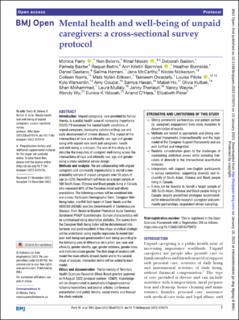| dc.contributor.author | Parry, Monica | |
| dc.contributor.author | Beleno, Ron | |
| dc.contributor.author | Nissim, Rinat | |
| dc.contributor.author | Baiden, Deborah | |
| dc.contributor.author | Baxter, Pamela | |
| dc.contributor.author | Betini, Raquel | |
| dc.contributor.author | Bjørnnes, Ann Kristin | |
| dc.contributor.author | Burnside, Heather | |
| dc.contributor.author | Gaetano, Daniel | |
| dc.contributor.author | Hemani, Salima | |
| dc.contributor.author | McCarthy, Jane | |
| dc.contributor.author | Nickerson, Nicole | |
| dc.contributor.author | Norris, Colleen | |
| dc.contributor.author | Nylén-Eriksen, Mats | |
| dc.contributor.author | Owadally, Tasneem | |
| dc.contributor.author | Pilote, Louise | |
| dc.contributor.author | Warkentin, Kyle | |
| dc.contributor.author | Coupal, Amy | |
| dc.contributor.author | Hasan, Samya | |
| dc.contributor.author | Ho, Mabel | |
| dc.contributor.author | Kulbak, Olivia | |
| dc.contributor.author | Mohammed, Shan | |
| dc.contributor.author | Mullaly, Laura | |
| dc.contributor.author | Theriault, Jenny | |
| dc.contributor.author | Wayne, Nancy | |
| dc.contributor.author | Wu, Wendy | |
| dc.contributor.author | Yeboah, Eunice K | |
| dc.contributor.author | O´Hara, Arland | |
| dc.contributor.author | Peter, Elizabeth | |
| dc.date.accessioned | 2023-02-07T13:56:41Z | |
| dc.date.available | 2023-02-07T13:56:41Z | |
| dc.date.created | 2023-01-26T10:27:37Z | |
| dc.date.issued | 2023-01-13 | |
| dc.identifier.citation | BMJ Open. 2023, 13 (1), . | en_US |
| dc.identifier.issn | 2044-6055 | |
| dc.identifier.uri | https://hdl.handle.net/11250/3048943 | |
| dc.description.abstract | Introduction: Unpaid caregiving, care provided by family/friends, is a public health issue of increasing importance. COVID-19 worsened the mental health conditions of unpaid caregivers, increasing substance/drug use and early development of chronic disease. The impact of the intersections of race and ethnicity, sex, age and gender along with unpaid care work and caregivers’ health and well-being is unknown. The aim of this study is to describe the inequities of caregiver well-being across the intersections of race and ethnicity, sex, age and gender using a cross-sectional survey design.
Methods and analysis: We are collaborating with unpaid caregivers and community organisations to recruit a non-probability sample of unpaid caregivers over 18 years of age (n=525). Recruitment will focus on a target sample of 305 South Asian, Chinese and Black people living in Canada, who represent 60% of the Canadian racial and ethnic populations. The following surveys will be combined into one survey: Participant Demographic Form, Caregiver Well-Being Index, interRAI Self-report of Carer Needs and the GENESIS (GENdEr and Sex DetermInantS of Cardiovascular Disease: From Bench to Beyond-Premature Acute Coronary Syndrome) PRAXY Questionnaire. Sample characteristics will be summarised using descriptive statistics. The scores from the Caregiver Well-Being Index will be dichotomised into fair/poor and good/excellent. A two-stage analytical strategy will be undertaken using logistic regression to model fair/poor well-being and good/excellent well-being according to the following axes of difference set a priori: sex, race and ethnicity, gender identity, age, gender relations, gender roles and institutionalised gender. The first stage of analysis will model the main effects of each factor and in the second stage of analysis, interaction terms will be added to each model.
Ethics and dissemination: The University of Toronto’s Health Sciences Research Ethics Board granted approval on 9 August 2022 (protocol number: 42609). Knowledge will be disseminated in pamphlets/infographics/email listservs/newsletters and journal articles, conference presentation and public forums, social media and through the study website. | en_US |
| dc.language.iso | eng | en_US |
| dc.publisher | BMJ Publishing Group | en_US |
| dc.relation.ispartofseries | BMJ Open;Volume 13, Issue 1 | |
| dc.rights | Navngivelse-Ikkekommersiell 4.0 Internasjonal | * |
| dc.rights.uri | http://creativecommons.org/licenses/by-nc/4.0/deed.no | * |
| dc.subject | Mental health | en_US |
| dc.subject | Unpaid caregiving | en_US |
| dc.subject | Caregivers | en_US |
| dc.subject | Public health | en_US |
| dc.subject | Caregiver well-being | en_US |
| dc.title | Mental health and well-being of unpaid caregivers: a cross-sectional survey protocol | en_US |
| dc.type | Peer reviewed | en_US |
| dc.type | Journal article | en_US |
| dc.description.version | publishedVersion | en_US |
| dc.rights.holder | © Author(s) (or their employer(s)) 2023 | en_US |
| dc.source.articlenumber | e070374 | en_US |
| cristin.ispublished | true | |
| cristin.fulltext | original | |
| cristin.qualitycode | 1 | |
| dc.identifier.doi | http://dx.doi.org/10.1136/bmjopen-2022-070374 | |
| dc.identifier.cristin | 2115391 | |
| dc.source.journal | BMJ Open | en_US |
| dc.source.volume | 13 | en_US |
| dc.source.issue | 1 | en_US |
| dc.source.pagenumber | 8 | en_US |

